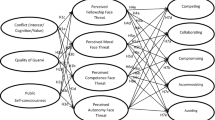Abstract
Chinese negotiators are known to have a negotiation emphasis that differs from their Western counterparts, especially in issues of face and conflict. These values, however, are not monolithic, and can change depending on the negotiation circumstance. This research examines how negotiation tactics changes when Chinese negotiators are faced with counterparts from near and distant cultures. An online conjoint simulation drew 351 respondents in Taiwan to test subjective perceptions of counterparts from the USA and Japan. Chinese respondents exhibited increased cultural accommodation when the counterpart’s culture was more distant – paying more attention to sacrificing self-interest and saving face for the other side. Integration in the negotiation was emphasized across both near and distant cultures above that observed for negotiation with Chinese counterparts. Saving face, ignoring conflict, and domination tactics were consistently valued, irrelevant of culture. Masculinity among Chinese respondents was exhibited in a preference for integration with male counterparts, especially for Chinese male negotiators. Results indicate practical considerations when preparing for negotiation with a Chinese counterpart by considering inconsistencies in preferences while also considering consistent values.
Similar content being viewed by others
References
Bond, M. H.: 1983, ‘How Language Variation Affects Inter-Cultural Differentiation of Values in Hong Kong Bilinguals’, Journal of Language and Social Psychology 2, 57-66.
Bond, M. H. and K. K. Hwang: 1986, The Psychology of the Chinese People (Oxford University Press, Hong Kong).
Cha, S. H.: 2003, ‘Modern Chinese Confucianism: The Contemporary Neo-Confucian Movement and Its Cultural Significance’, Social Compass 50(4), 481-91.
Cheung, M. and M. Liu: 1999, ‘The Self-Concept of Chinese Women and the Indigenization of Social Work in China’, International Social Work 47(1), 109-27.
Chow, H. S. and I. Ng: 2004, ‘The Characteristics of Chinese Personal Ties (Guanxi): Evidence from Hong Kong’, Organization Studies 25(7), 1075-93.
Deverge, M.: 1986, ‘Negotiating with the Chinese’, Euro-Asia Business Review 5(1), 34-36.
Fung, A.: 2000, ‘Feminist Philosophy and Cultural Representation in the Asian Context’, Gazette 62(2), 153-65.
Gudykunst, W. and S. Ting-Toomey: 1988, ‘Culture and Active Communication’, American Behavioral Scientist 31, 384-400.
Hofstede, G.: 1980, Cultures Consequences (Sage, Newbury Park, CA).
Hofstede, G.: 1998, “Masculinity/Femininity as a Dimension of Culture”, Masculinity and Femininity: The Taboo Dimension of National Cultures, (SAGE, Thousand Oaks, CA), pp. 3-28.
Hofstede, G.: 2005, Cultures and Organizations: Software of the Mind (McGraw-Hill, London).
Ko, D. Y.: 1994, Teacher of the Inner Chambers: Women and Culture in China, 1573-1722 (Stanford University Press, Stanford, CA).
Kurman, J.: 2001, ‘Self-Regulation Strategies in Achievement Settings: Culture and Gender Differences’, Journal of Cross-Cultural Psychology 32(4), 491-503.
Lee, Z. N.: 1999, ‘Korean Culture and Sense of Shame’, Transcultural Psychiatry 36(2), 181-94.
Lee, J. W., P. S. Jones, Y. Y. Mineyama, and X. E. Zhang: 2002, ‘Cultural Differences in Responses to a Likert Scale’, Research in Nursing & Health 25(4), 295-306.
Leung, K.: 1996, “The Role of Beliefs in Chinese Culture”, In M. H. Bond (Ed.) The Handbook of Chinese Psychology, (Oxford University Press, Hong Kong), pp. 247-53.
Lo, M. C. and E. M. Otis: 2003, ‘Guanxi Civility: Processes, Potentials, and Contingencies’, Politics & Society 31(1), 131-62.
Ma, Z., X. Wang, A. Jaeger, T. Anderson, Y. Wang, and D. Saunders: 2002, ‘Individual, Perception, Bargaining Behavior, and Negotiation Outcomes: A Comparison across Two Countries’, International Journal of Cross Cultural Management 2(2), 171-84.
Matsudaira, T.: 2003, ‘Cultural Influences on the Use of Social Support by Chinese Immigrants in Japan: “Face” as a Keyword’, Qualitative Health Research 13(3), 343-57.
Miles, M.: 2003, ‘Negotiating with the Chinese: Lessons from the Field’, The Journal of Applied Behavioral Science 39(4), 453-72.
Ng, S. H., A. B. M. Akhtar-Hoosain, P. Ball, M. H. Bond, K. Hayashi, S. P. Lim, M. P. O’Driscoll, D. Sinha, and K. S. Yang: 1982, “Human Values in Nine Countries”, In P. Rath, H. S. Ashanta, D. Sinha and J. B. P. Sinha (Eds.), Diversity and Unity in Cross-Cultural Psychology, (Swets and Zeitlinger, Lisse, The Netherlands), pp. 196-205.
Oetzel, J. G. and S. Ting-Toomey: 2003, ‘Face Concerns in International Conflict: A Cross-Cultural Empirical Test of the Face Negotiation Theory’, Communication Research 30(6), 599-624.
Pruitt, D. G. and J. Z. Rubin: 1986, Social Conflict, Escalation, Stalemate and Settlement (Random House, New York).
Salacuse, J. W.: 1998, ‘Ten Ways That Culture Affects Negotiating Style: Some Survey Results’, Negotiation Journal 14(3), 221-40.
Stewart, S. M., M. H. Bond, O. Deeds, and S. F. Chung: 1999, ‘Intergenerational Patterns of Values and Autonomy Expectations in Cultures of Relatedness and Separateness’, Journal of Cross-Cultural Psychology 30(5), 575-93.
Stuhlmacher, A. F. and A. E. Walters: 1999, ‘Gender Differences in Negotiation Outcome: A Meta-Analysis’, Personnel Psychology 52(3), 653-77.
Thompson, L. and R. Hastie: 1990, ‘Social Perception in Negotiation’, Organizational Behavior and Human Decision Processes 47, 98-123.
Ting-Toomey, S.: 1998, ‘Intercultural Conflict Styles: A Face-Negotiation Theory’, In Y. Y. Kim and W. B. Gudykunst (Eds.), Theories in International Communication, (Sage, Newbury Park, CA), pp. 213-35.
Tinsley, C. H.: 1997, ‘Understanding Conflict in a Chinese Cultural Context’, Research on Negotiation in Organizations 6, 209-25.
Warden, C., M. K. Lai and W. Y. Wu: 2002, ‘How World-Wide Is Marketing Communication on the World Wide Web?’, Journal of Advertising Research 42(5), 72–84
Watson, R. E. and R. B. McKersie: 1965, A Behavioral Theory of Labor Negotiations (McGraw-Hill, New York).
Yan, J. and R. L. Sorenson: 2004, ‘The Influence of Confucian Ideology on Conflict in Chinese Family Business’, International Journal of Cross Cultural Management 4(1), 5-17.
Yang, K. S. and M. H. Bond: 1980, ‘Ethnic Affirmation by Chinese Bilinguals’, Journal of Cross-Cultural Psychology 11, 411-25.
Yeung, A., C. M. Ruby, and W. K. Yu: 1999, ‘Managing Social Exclusion’, International Social Work 47(4), 503-13.
Acknowledgments
National Science Council, Republic of China and Research Center for the Humanities and Social Sciences, National Chung Hsing University.
Author information
Authors and Affiliations
Corresponding author
Rights and permissions
About this article
Cite this article
Warden, C.A., Chen, J.F. Chinese Negotiators’ Subjective Variations in Intercultural Negotiations. J Bus Ethics 88 (Suppl 3), 529–537 (2009). https://doi.org/10.1007/s10551-009-0300-0
Published:
Issue Date:
DOI: https://doi.org/10.1007/s10551-009-0300-0




